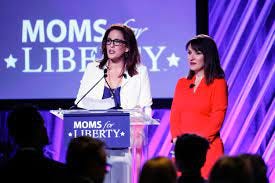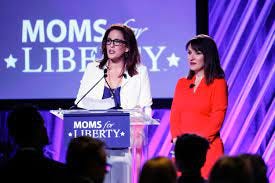This month I start a two-year term on the board of directors of my granddaughter’s charter school. The board is self-perpetuating, screening volunteers and then taking action to approve appointments to fill vacancies. The school is K-8 and just got into a new building. I put my name forward because I was looking for a way to get involved (in addition to doing school pickup twice a week).
But part of why I wanted to do this is in reaction to everything that has been going on in schools across a series of red states. Books put under review. Teachers investigated for showing the wrong Pixar movie. Not satisfied with not supporting teachers, but now declaring them groomers intent on harming children.
For all I know, none of these issues will arise in our school. I’ve been to two meetings as a visitor and nobody came for the community comment section of the agenda. But it’s not out of the range of possibility. So I wanted to be present just in case. Also, I want to see the school continue to provide a quality education for its students in support of its overall mission.
Earlier this month, ABC News reported that Moms for Liberty is intent on providing financial support to school board races. The story reported:
So far, the group has had mixed success at getting its preferred candidates elected. In 2022, slightly more than half of the 500 school board candidates it endorsed across the country won. In the spring of 2023, fewer than one-third of the nearly 30 candidates it endorsed in Wisconsin were elected.
Focusing on state-level candidates could give Moms for Liberty an opportunity to assert its influence on some of the positions that have more control in determining curriculum, said Jon Valant, a senior fellow at the Brookings Institution who has studied education policy.
Last month, Moms for Liberty held a conference in Philadelphia and heard from the major Republican candidates. Arguing under the guise of promoting “parents’ rights”, the speakers repeated the claims I mentioned above. They decry pornography being shown to children and critical race theory introduced to elementary students designed to make them feel bad for being white. They are concerned about books or conversations regarding LGBT topics (like “And Tango Makes Three”) because they argue that such books will cause children to question their own gender identity.1
Children are aware of racial differences. They have some sense of who has resources and who doesn’t. They have family members or neighbors in gay marriages. Furthermore, we are preparing them for life in a diverse world after their schooling that is changing as I write.2
The book banners are fighting on behalf of imagined students who might be somehow harmed by the books in the library. Not that anyone has made complaints or demonstrated such harms.
Back in May, an analysis by the Washington Post found that books dealing with LGBT topics (or even titles) were a focal point of the banners. Remarkably, the analysis showed that “[t]he majority of the 1000 books challenges analyzed by the Post were filed by just 11 people.” Eleven People!
Then you get the anti-teacher claims. Over the weekend, Charlie Kirk was asked what he meant when he said “groomer”. I hate to quote him but here it is:
A groomer is a person who pushes grossly inappropriate sexual topics onto young children for the purpose of normalizing sexual behavior, exposing them to abuse, or implanting the notion they should mutilate their bodies to cure ‘dysphoria’. Turning Point does none of these things, because we aren’t perverted progressives projecting our delusions onto kindergartners.
It’s really hard to deconstruct this horrible word salad. Yes, someone who did everything in the first sentence would shock us. But that’s because he leaves undefined terms like “inappropriate”, “abuse”, or “mutilate”. It becomes easier to read if you look at the second sentence: “perverted progressives”.
These vague claims (which sound horrible) are undefined for a reason. They are designed to be used as weapons in exactly the same way Chris Rufo used “CRT” or the way that Ron DeSantis uses “Woke”. If the terms are underdetermined, then you can wield the attack against virtually anyone — like the teacher who showed Pixar’s Strange World.
This post was prompted by an Op-Ed yesterday by E.J. Dionne. He argued that care for families and communities are shared values and that (the not perverted) progressives have ceded the argument to conservatives.
A fear of reinforcing right-wing talking points in such controversies can make liberals and progressives wary of saying what most of them believe: that the well-being of children is closely tied to the health of families. They should drop their hesitancy and instead remind their conservative friends that families come in many varieties and that public policy affects family well-being.
I’ve always enjoyed Dionne’s writing. This piece was special because he quoted the late sociologist Amitai Etzioni. He cites Etzioni’s 1993 book “The Spirit of Community”. I was a big fan of Etzioni’s “The New Golden Rule” from 1998 (another book that didn’t survive my moves). In that book Etzioni (as I remember) argued that our ideas of individual freedom and collective responsibility exist in what he called “an inverted symbiosis”. As we push too far toward one extreme, there is a countervailing pressure toward the other. I hate quoting Wikipedia but I don’t have the original source:
[O]ne should not treat preferences as unadulterated expressions of individual freedom and should allow for public education to improve these preferences when they turn asocial and surely when they turn anti-social in dogmatic liberal societies.
As Dionne argues, we need to keep families and communities in our sights as we frame public policy. Not the conservative’s imagined harms but actual families. So concerns about educational funding, quality learning, health care, and food supports exist for all children and their parents. Such a focus for all children and not the imagined few, gained by listening to their actual parents as opposed to self-appointed censors, has the potential of helping mend our social divides. He concludes his article as follows:
Calling on all sides to explore common ground does not mean denying that polarization is asymmetric, that the right has radicalized far more than the left. But this can’t be an excuse for giving up the effort, because we can’t go on like this — and if family and community can’t draw us closer to each other, I don’t know what will.
I hope and pray that I don’t have to put these arguments to the test in my board role over the next two or more years. But if that’s what’s needed, I’m ready. Because the stakes are simply too high to let these alternative arguments go unchecked.
A wise gay Twitter author pointed out that he grew up with books that celebrated heterosexual two parent families (Dick and Jane, anyone?) and it had no impact on his sexual orientation.
Just learned recently that Hispanics are now the largest group (but still a minority) in Texas.





Excellent commentary, John. I’m glad to hear you’re on the school’s board, and hopeful that many more folk of like mind will begin to be represented on more educational boards across the country. It’s a scary time for academic rigor and intellectual authenticity.